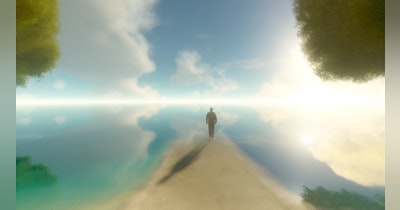This article is about the Stoic God as I view it and not as the Ancient Stoics viewed it. However, while I am altogether disinterested in advancing the ancient interpretation of the God of Stoicism (in the same way contemporary doctors are likely wholly disinterested in advancing lobotomies as a viable treatment for schizophrenia), I feel I must spend the first part of this article providing an overview of the Ancient Stoic view of God for the sake of creating greater contrast between those views and my own.
The Stoics had their intellect, and the knowledge available to them during their time, to explain the God they speak of in their writings. I have access to my intellect and the knowledge available today, and so my view of the Stoic god is not Zeno’s view of the Stoic God and, frankly, it doesn’t need to be any contemporary Stoic’s view of the Stoic God because Stoicism wasn’t intended to be dogmatic — some of the reason Stoicism isn’t a religion.
Stoicism is, in part, about using our rational faculties to assent to impressions about the world that are reasonable and logical to assent to. Obviously, between 300BCE and 2023ACE, our understanding of “reasonable and logical to assent to” has, at the very least, expanded if not evolved into something the Ancient Stoics may not even recognize.
Finding this preamble already too long, I will now begin.
The Ancient Stoics On God
The Ancient Stoics seem to have defined god in two ways. First, there was God. The logical, benevolent Reason (note the capitalization of that word) that ordered the Cosmos. Second, there were gods. Anything that was consistent enough in its adherence to its own nature, rose to the level of "a god". Planets, with their (seemingly) ever-consistent adherence to fulfilling their natural roles (orbiting and such) were god-like since that flawless adherence was viewed as an expression and embodiment of pure Reason. Hence, god-like. Hence, gods.
There are some questions that crop up, for me, concerning this definition of God. For example, since the Stoic sage is perfect in their adherence to their nature, are Stoic sages gods? The answer to that question is no. The reason for that answer is, or seems to be, that humans must choose to adhere to their nature while planets simply do adhere to their nature.
Fair enough, but what about honeybees? Honeybees do not choose to adhere to their nature, as they lack the level of consciousness necessary to make these sorts of autonomous decisions. Honeybees, then, must be gods, no? No. Why? I cannot find an answer. It might have something to do with their small scale, or that the Stoics could have viewed their adherence to their nature as being too vulnerable to disruption by humans (or other outside forces). In any event, honeybees (and sages) aren't gods by any Stoic definition.
Just like the Ancient Stoics, I believe planets adhere to their nature with extreme consistency. To be Virtuous is to live according to one's nature perfectly. Planets "live" according to their nature perfectly, so I do believe planets are virtuous given my understanding of Virtue. I don't think of them as gods, though, I think of them as "virtuous inanimates". This is just a change of language though. Whether we call them gods or virtuous inanimates, they are things which "do the thing they appear to be made to do with unfailing consistency".
How about the second Stoic God? The God of Reason, of the Logos? The underpinning force that ordered and orders the Cosmos? What about that Stoic God?
The Ancient Stoics believe in the Pneuma, or "Divine Breath". This Pneuma was composed of Air (coolness) and Fire (heat). Different amounts of Air, in various tensions with different amounts of Fire, would create the material of the Universe. Humans, for example, are composed of a Fire-heavy mixture of Fire and Air that is in a high state of tension. Rocks, on the other hand, are composed of an Air-heavy mixture of Fire and Air that is in a lower state of tension. The more fire, and the higher tension, the more "alive" something is (that's not perfectly said, but I think it's good enough for the purposes of this article).
The Cosmos, then, and all of its corporeal parts, are derived from Pneuma – the Divine Breath. Now, stick with me, because this next part is a little wonky. This Pneuma, this Divine Breath, this mixture of Air and Fire, is ever-present in the Universe. In Stoicism, cyclicly, on a timescale we cannot even comprehend as humans, there is something called the Great Conflagration. This is a cosmic fire that "resets" the Universe. How this reset is facilitated isn't really clear (in anything I've read on the subject) but it seems to go something like this:
All of the Universe began as a compressed, super hot singularity of Air and Fire (the Pneuma in absolute tension, holding together all universal material). Then, boom! The great cosmic fire happens and the Pneuma is spread out in all directions and, depending on the concentrations of Air and Fire at any given point in that expanse, begins mixing, holding various tensions, and creating the material objects of the Universe. Eventually, there is another cosmic fire. This second fire, however, seem to be a contraction that brings everything back to one point again. This cycle repeats for eternity. It is like the breathing in and breathing out of the Pneuma.
Finally, the Stoic God is made of the Pneuma. Meaning the Stoic God isn't a being, it is the phenomenon that arises out of the mixing of Air and Fire. Since this phenomenon happens everywhere, and within everything, God is both everywhere and everything – the Stoic God is Nature itself, is the fabric of existence.
And here I will tap out of attempting to explain the God of the Ancient Stoics (academics rejoice!).
My View Of The Stoic God
I live in the 21st Century. This isn’t a condemnation of those who didn’t have the privilege — as much as it can be called a privilege, which I'm sure is very much up for debate — it is a statement of fact that is meant to highlight the obvious: the human body of knowledge is far more expansive today than it it was in the 19th Century or, for that matter, the 4th Century BCE when Zeno and company were founding and developing Stoicism as a holistic philosophy of everything; less a philosophy and more entire worldview.
With access to this new expanse of knowledge, unless I feel compelled (for whatever reason) to don the label “originalist”, I feel strongly I must at least explore the new thinking this new knowledge enables me to do – even if it leads me to heterodox conclusions. I am not saying I must arrive at heterodox conclusions, only that I must at least consider new information and see whether that information leads me to conclusions I, personally, believe are more appropriate.
The Cosmos does appear to be ordered. There is a seeming homeostasis present — enough so, anyway, that things can exist reliably (from the human perspective). If we look at long-time, however, it’s clear that entropy is increasing at a rapid rate and soon (on a cosmic time scale, not a human one) the Universe will tear itself apart or, at least, things within the Universe will become so distant from one another that there will be no warmth so sustain life anywhere in the entirety of said Universe.
Ignoring the existential crisis encouraged by that last sentence, we should take a moment to recognize that this is not inconsistent with the Ancient Stoic view of a cyclical cosmic fires – but let's put the on the back burner for a moment.
Where did the apparent order of the Cosmos come from, if not from Pneuma? Everything has an origin, right? A watchmaker’s argument of some kind? I’m not so sure about that. I don’t know that the sudden existence of the universe requires a maker or, for that matter, an origin. Regardless of whether you believe you agree with this idea, you absolutely do agree with it.
"How dare you!" Well, let's see.
Whether you believe in a supernatural “God”, a “Divine Breath”, or a sudden cosmic Bang out of nothingness, you believe something without an origin or creator existed first. So, let’s be intellectually honest with ourselves about the inevitable need for presuppositions in our human theories about existence and the nature of the Universe (and let's not judge those with different presuppositions in a manner that suggests our presuppositions are somehow more substantial). I think that's fair to ask of ourselves, whether we are theists, atheists, or anything else.
Now, while I do believe the Cosmos appears ordered and, functionally, operates as if it were, I do not believe it was ordered.
Human beings have a tendency to see patterns in existence and, being a beneficiary of those patterns (such as strokes of luck or series of events that lead to exactly a desired outcome), want to ascribe a meaning and origin to them. For example: the Universe exists, it exists in a form that allows us to exist, and there’s no way that much good fortune could occur without there being some sort of intent behind it. Right? I think wrong. It is like tripping an falling on the side walk, landing squarely in a pile of money and thinking, since you were just talking about needing more money earlier that morning, someone put the money pile there specifically so that you would land in it. They didn't. You just landed in a pile of money. Lucky you.
Just because the Universe is here, doesn't mean it was meant to be here. The Pneuma isn't conscious, it doesn't, through mixture and tension, create matter, and it doesn't form and design things rationally.
My opinion is that the Ancient Stoics believed the Cosmos were ordered, essentially, because they could not fathom how anything else could be the case. From this presupposition (and others) they developed their physics and defended it with logical statements and sound conclusions. Then they tossed in a bit of humanopocentric language and ran with it. And, you know what? I don’t believe that takes anything away from the Ancient Stoic’s or the philosophy they authored 2300 years ago.
Our Universe, at the human scale of time, absolutely operates like a well-ordered and oiled machine — there’s no denying that. The sun has risen and set every day since the coming-to-be of the rock we live on. Animals can reproduce reliably. DNA exists. For goodness sake, math exists! The Universe must be pretty damn consistent in order for math not to change every five seconds, or centuries for that matter.
If the God of Stoicism is simply “reasoned order and its results” (Nature), and our Universe operates (from our perspective) in an ordered way, I don’t feel there’s any problem whatsoever with choosing to believe in the Stoic God precisely as the Ancient Stoics did because, functionally and practically, it doesn’t make a difference. It doesn’t make a difference because, whether you believe the Universe is ordered by Divine Providence or that it only seems to function as if it were ordered by Divine Providence, the end result is the same: the Universe functions in a way that sustains itself and us. From the latter position, it requires no leap of faith to hold the opinion that mirroring Nature is worth doing — that becoming as consistent in your humanness as the Universe is in its Universe-ness (through the process of working to develop a perfect moral character) is the only Good. From the former, the leap of faith required is only that developing a virtuous character is the only good.
I don't care which leap you make. I only care, and believe you should only care, that you’re working towards a virtuous character. The rest of it is best left to those interested in either the academic pursuit of understand Stoicism historically or the those wanting to practice the most original form of Stoicism because they fell so compelled to do so.
In conclusion...
For me, the Stoic God is simply what we Stoics call the phenomenon of existence, and all the seeming wonder bundled up in it. The Ancient Stoics thought that wonder needed an explanation, and they come up with a great one. Ultimately, though, it's all wordplay and busy work to those of us alive today. Call it God, call it Nature, call it Magic, call it the Great Accident; none of that really matters (not to me, anyway). Read all the Stoic texts or read none of them, be a Traditional Stoic or a Modern Stoic, spend years of your life studying the ins and outs of the philosophy, or don't. In the end all of it comes down to Virtue being the only good and whether or not you behave in ways that move you closer to attaining it.
If you do that, you might not call yourself a Stoic (or you might), but you'll be doing everything a Stoic does – and isn't that kind of the point?
The rest of it is dudes in comment sections arguing endlessly about details that, no matter what, lead them to pursuing Virtue. If you need to understand those details to internalize the belief that Virtue is the only good, that's fine. That's the same reason people become religious; they need to internalize a belief in order to be convinced being a good person actually matters. And, just as with religions, as soon as the -ism becomes about the details instead of about the point, shit starts getting real weird real fast.
That's how I feel, anyway.
Thanks for reading.









